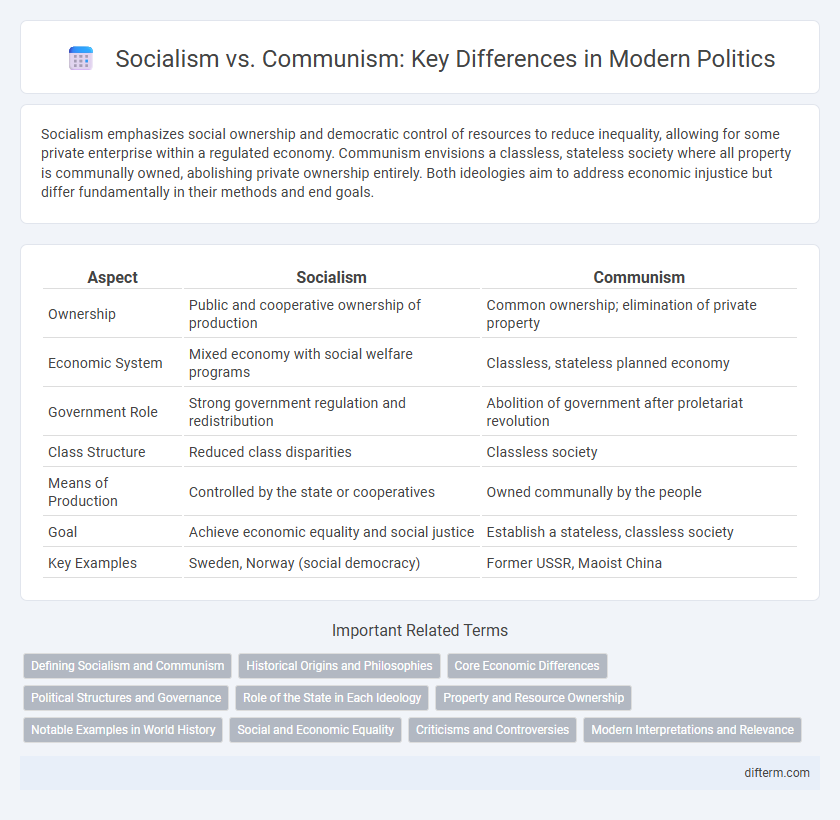Socialism emphasizes social ownership and democratic control of resources to reduce inequality, allowing for some private enterprise within a regulated economy. Communism envisions a classless, stateless society where all property is communally owned, abolishing private ownership entirely. Both ideologies aim to address economic injustice but differ fundamentally in their methods and end goals.
Table of Comparison
| Aspect | Socialism | Communism |
|---|---|---|
| Ownership | Public and cooperative ownership of production | Common ownership; elimination of private property |
| Economic System | Mixed economy with social welfare programs | Classless, stateless planned economy |
| Government Role | Strong government regulation and redistribution | Abolition of government after proletariat revolution |
| Class Structure | Reduced class disparities | Classless society |
| Means of Production | Controlled by the state or cooperatives | Owned communally by the people |
| Goal | Achieve economic equality and social justice | Establish a stateless, classless society |
| Key Examples | Sweden, Norway (social democracy) | Former USSR, Maoist China |
Defining Socialism and Communism
Socialism is an economic and political system where the means of production are owned or regulated by the community as a whole, aiming to reduce income inequality through wealth redistribution and social welfare programs. Communism, derived from Marxist theory, envisions a classless, stateless society where all property is communally owned, abolishing private ownership entirely to achieve complete social and economic equality. Both ideologies seek to address disparities created by capitalism but differ significantly in their approaches to governance, property rights, and societal structure.
Historical Origins and Philosophies
Socialism originated in the early 19th century as a response to the inequalities produced by industrial capitalism, emphasizing collective ownership and democratic control of resources to ensure economic equity. Communism, rooted in the works of Karl Marx and Friedrich Engels, envisioned a classless society achieved through the abolition of private property and the establishment of a proletarian dictatorship to transition toward a stateless, classless system. Both ideologies share a critique of capitalism but differ in methods and ultimate goals, with socialism allowing for some level of state or cooperative ownership while communism seeks total communal ownership and the end of all class distinctions.
Core Economic Differences
Socialism advocates for collective or governmental ownership of key industries while allowing for some private enterprise, aiming to reduce income inequality through redistributive policies and social welfare programs. Communism seeks to establish a classless society by abolishing private property entirely, with all means of production owned and controlled by the community or state. The core economic difference lies in socialism's tolerance for mixed economies versus communism's goal of a fully planned economy with centralized control over all economic activity.
Political Structures and Governance
Socialism advocates for a political structure where the state controls key industries within a democratic framework, allowing for public participation and multi-party systems. Communism promotes a classless, stateless society with collective ownership of all property, typically implemented through a single-party regime that directs all governance and economic activity. The fundamental difference lies in socialism's acceptance of political pluralism versus communism's centralized, authoritarian control.
Role of the State in Each Ideology
Socialism emphasizes a significant role for the state in regulating the economy and redistributing wealth to ensure social equity while allowing for some private ownership. Communism advocates for a stateless, classless society where all property is communally owned, and the state eventually withers away after a transitional period of proletarian rule. The state's role in socialism is a tool for social justice, whereas in communism, it is a temporary mechanism to achieve total communal ownership and equality.
Property and Resource Ownership
Socialism advocates for collective or governmental ownership of production means while allowing some private property, aiming to reduce inequality through wealth redistribution. Communism demands the abolition of all private property, establishing communal ownership to eliminate class distinctions entirely. Both systems reject capitalist private ownership but differ in scope and implementation of resource control.
Notable Examples in World History
Socialism found notable expression in the policies of Scandinavian countries, like Sweden and Denmark, where democratic frameworks support extensive social welfare and public ownership without abolishing capitalism. Communism, characterized by a stateless, classless society advocating common ownership of production means, was implemented in the Soviet Union under Lenin and Stalin, profoundly influencing 20th-century geopolitics. Both ideologies inspired revolutionary movements and shaped governance models, reflecting contrasting approaches to achieving economic equality and social justice.
Social and Economic Equality
Socialism advocates for social and economic equality through public or collective ownership of resources while preserving some elements of market mechanisms. Communism seeks absolute equality by eliminating private property and establishing a classless society controlled by the state or community as a whole. Both systems aim to reduce wealth disparities, but socialism allows for more flexibility in economic planning compared to communism's centralized control.
Criticisms and Controversies
Socialism faces criticism for its perceived inefficiency in resource allocation and potential to stifle individual entrepreneurship, leading to slower economic growth. Communism is often associated with authoritarian governance and suppression of political freedoms, as historical implementations have resulted in significant human rights abuses. Both ideologies are controversial for their approaches to property ownership and wealth redistribution, sparking debates over economic freedom versus social equity.
Modern Interpretations and Relevance
Modern interpretations of socialism emphasize democratic control of resources, social welfare, and reducing economic inequality within a capitalist framework. Communism, in its contemporary relevance, is often viewed as an ideological goal rather than an achievable system, with few nations pursuing strict Marxist-Leninist models. The debate centers on balancing individual freedoms and collective ownership to address global challenges like poverty and climate change.
socialism vs communism Infographic

 difterm.com
difterm.com